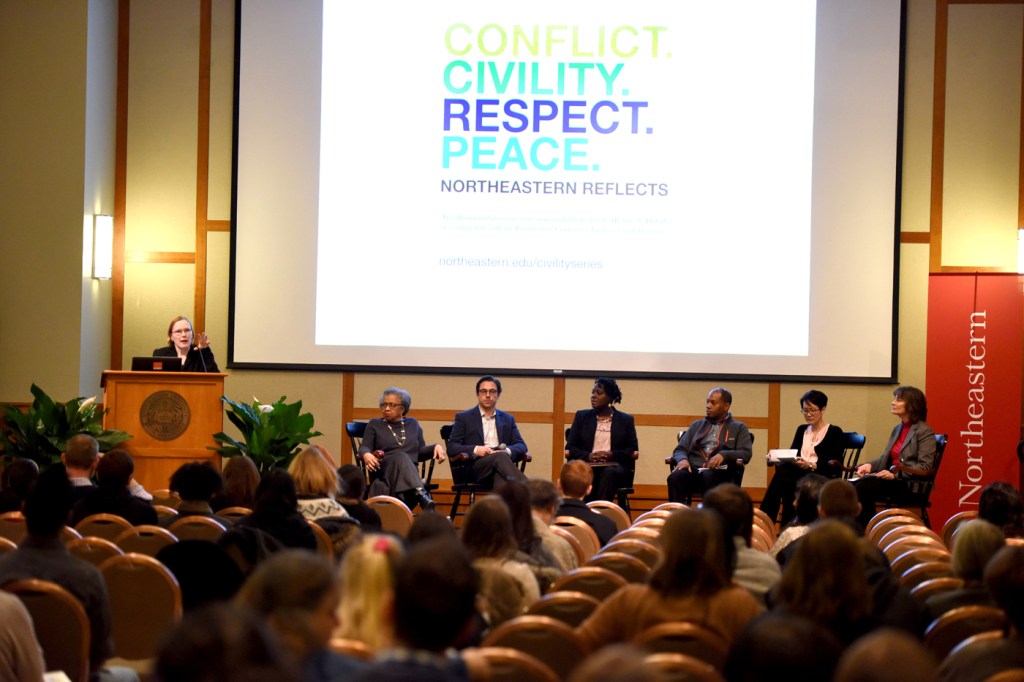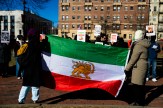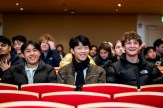How can a campus be a model community?

How can a campus be a model community? That question provided the catalyst for a vibrant discussion on inclusion and diversity Thursday night among an interdisciplinary panel of Northeastern faculty and staff as well as members of the greater university community.
The event marked the ninth installment of “Conflict. Civility. Respect. Peace. Northeastern Reflects,” the university’s educational series on civic sustainability. The theme of the discussion looked to overlap with this week’s celebration of Martin Luther King Jr.’s life and legacy as well as last week’s call to action by Northeastern President Joseph E. Aoun to deepen the university community’s effort to promote diversity on campus and to foster inclusion in Boston and the wider world.
In her opening remarks, the event’s moderator, law professor Margaret Burnham, noted that diversity is a lifetime project. “Here at our university diversity is as important as it is in every other aspect of our life,” she added. “It is not just a one shot deal and this is not just a one shot conversation.”
The College of Social Sciences and Humanities, the Office of Student Affairs, and the School of Law presented the event. Each panelist spoke about what factors make a model community and shared personal experiences of how they tried to better their communities.
I think inclusivity is not a state of being, I think it is an action. I think it is something that needs to be practiced, reflected on, and continued to be worked on.”
—Delia Cheung Hom, director of Northeastern’s Asian American Center
Ellen Cushman, dean’s professor of civic sustainability, professor of English, and director for civic sustainability, diversity, and inclusion initiatives
A Cherokee Nation citizen, Cushman began her presentation speaking in Cherokee, which she said she does for many of her talks as a way to work toward a sense of shared communities. She said it signals a difference about her that may not be visible and helps her connect to those who are part of her thinking and work.
“Listening is a key aspect of creating communities but is also seen as the least important of the language arts,” Cushman said. “Listening is an act of engaging, understanding, and appreciating. It creates a third shared space of understanding with a person.”
Delia Cheung Hom, director of Northeastern’s Asian American Center
Cheung Hom said the most important characteristic for a model community is that all members feel a sense of belonging. Then she noted that when she was younger, she felt invisible, such as a time in college when she recorded present for a student government meeting, then sat out in the hallway and no one came to get her.
“I think our actions as a community have to be intentional,” she said. “I think inclusivity is not a state of being, I think it is an action. I think it is something that needs to be practiced, reflected on, and continued to be worked on.”

Photo by Matthew Modoono/Northeastern University
Derek Lumpkins, director of neighborhood partnerships and programs for Northeastern Crossing
Northeastern Crossing, which is located on Tremont Street, was unveiled in September and is the university’s first formal venue dedicated to fostering dialogue, creative collaboration, and new connections between city residents and Northeastern students, faculty, and staff. When he was asked to participate in this event, Lumpkins said one of the first things that popped into his mind was the power of networks, and he sees Northeastern Crossing as a portal to building new networks and collaborations for the university.
“I really believe in the power of networks to change the dynamic both here on campus and in general,” Lumpkins said.
Shaya Gregory Poku, program director for Northeastern’s Social Justice Resource Center
Poku noted that King said life’s most consistent and urgent question is, “What are we doing for others?,” And that, Poku said, is a question that is very important to Northeastern students.
“The students benefit from our mission to create and translate knowledge to meet global and societal needs,” Poku said. “We should be at the forefront of ensuring our students’ fervor to create change does not drown out the voices and contributions of the very people they are trying to assist.”
Dov Waxman, professor of political science, international affairs, and Israel studies, and co-director of Northeastern’s Middle East Center
Waxman said there are three core principles that a model community values: inclusivity, tolerance, and critical inquiry.
“And I think that’s the goal,” Waxman said. “But I think the challenge we face here is how do we promote a community based on inclusivity, tolerance, and critical inquiry when we are embedded in a wider context in which those values are widely challenged.”





